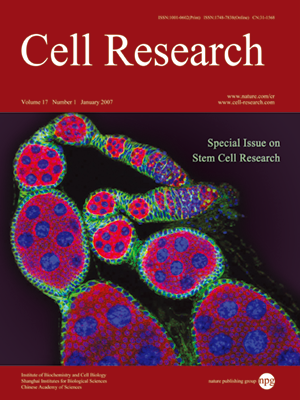
Volume 17, No 1, Jan 2007
ISSN: 1001-0602
EISSN: 1748-7838 2018
impact factor 17.848*
(Clarivate Analytics, 2019)
Volume 17 Issue 1, January 2007: 73-79
ORIGINAL ARTICLES
Upregulation of Flk-1 by bFGF via the ERK pathway is essential for VEGF-mediated promotion of neural stem cell proliferation
Zhifeng Xiao1, Yaxian Kong1, Shufa Yang1, Meiyu Li1, Jinhua Wen1, Lingsong Li1
1Peking University Stem Cell Research Center and Cell Biology Department, Peking University Health Science Center, Beijing,
China
Correspondence: Jinhua Wen(jhwen@bjmu.edu.cn)
Neural stem cells (NSCs) constitute the cellular basis for embryonic brain development and neurogenesis. The process is regulated by NSC niche including neighbor cells such as vascular and glial cells. Since both vascular and glial cells secrete vascular endothelial growth factor (VEGF) and basic fibroblast growth factor (bFGF), we assessed the effect of VEGF and bFGF on NSC proliferation using nearly homogeneous NSCs that were differentiated from mouse embryonic stem cells. VEGF alone did not have any significant effect. When bFGF was added, however, VEGF stimulated NSC proliferation in a dose-dependent manner, and this stimulation was inhibited by ZM323881, a VEGF receptor (Flk-1)- specific inhibitor. Interestingly, ZM323881 also inhibited cell proliferation in the absence of exogenous VEGF, suggesting that VEGF autocrine plays a role in the proliferation of NSCs. The stimulatory effect of VEGF on NSC proliferation depends on bFGF, which is likely due to the fact that expression of Flk-1 was upregulated by bFGF via phosphorylation of ERK1/2. Collectively, this study may provide insight into the mechanisms by which microenvironmental niche signals regulate NSCs.
Cell Research advance online publication 9 January 2007; doi: 10.1038/sj.cr.7310126
FULL TEXT | PDF
Browse 2092


